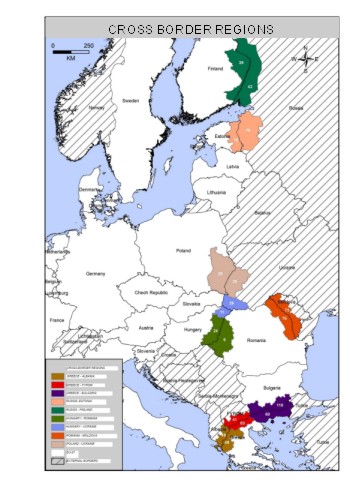General Information
The EXLINEA Programme: “Lines of exclusion as
Arenas of Cooperation: Reconfiguring the External
Boundaries of Europe – Policies, Practices,
perceptions”, is funded by the European Commission
under the 5th Action Framework for Research and Technological
Development. The following take part in this programme:
Open University of Berlin (Germany), as coordinator,
The Development Centre for south east Europe of the
University of Thessaly, the Cross border Centre Peipsi
(Estonia), the Centre for border Researsh in Nijmegen
(Holland) , the Karelian Intituteof the University
of Johensu (Finland), the Department of political
sciences of the University of Tartu (Estonia), the
Centre for Regional Studies of the Academy of Sciences
in Hungary and the European Institute of Regional
and Local Development in Warsaw (Poland).
The aim of the project is to examine capacities for cross-border co-operation and governance in CEE in anticipation of EU expansion. Cross-border region- building in Europe has developed in response to political and socio-economic challenges of integration as well as to opportunity structures provided by the EU. Still, its overall political (and problem- solving) significance in the context of enlargement is as yet unclear. The project seeks to contribute practical and scientific knowledge to this important policy area through 1) conceptualizing cross-border region-building as a product of social and spatial practices involving formal institutionalizations (explicit political constraints and opportunity structures) and informal integration (social interaction, participation of civil society), and 2) informing wider scientific and policy debate by providing empirical data.
Empirical Work. Content and methodology
The empirical work has been organised around a) Standardised
questionnaires b) In depth interviews and c) local
seminar, focus group and data and document collection.
Through triangulation has been attempted to verify
the validity of the various data sources as well as
the methodology chosen. Policies, practises and perceptions
have comprised the main focal point of the research
framework.
Four hundred standardized questionnaires have been
collected in order to assist the empirical analysis
during the period May-December 2004. More specifically,
ninety eight (98) questionnaires were collected from
the Greece-Albania border zone of, a hundred and twenty
four (124) from the Greece-FYROM zone and a hundred
and seventy eight (178) from the Greece-Bulgaria zone.
Table illustrates the basic profile of the sample
which includes respondents from the public and the
private sector, comprising a balanced sample.
Table: The profile of the research sample
| (a) Public |
186 |
(b) Private |
214 |
| Local Authorities |
86 |
Local Chambers |
27 |
| Public Agencies |
27 |
Selected large firms |
140 |
| Development agencies |
47 |
Consultants |
23 |
| Agencies promoting cbc |
11 |
Journalists |
6 |
| Universities and Institutions |
15 |
NGO’s |
18 |
TOTAL 400 |
Moreover, in the three cross-border zones, a total
of fifty (50) in-depth interviews have been carried
out with experts on issues of cross-border collaboration
during the period January-May 2005. Half of these
interviews took place in the Greek border zone area
and the rest of them in the other side of the borders.
In more detail, in the Greece-Albania zone fourteen
(14) interviews took place, in the Greece-FYROM
zone sixteen (16), and, in the Greece-Bulgaria zone
twenty (20) interviews took place.
Finally, a local seminar was held in July 2005,
involving stakeholders and experts, where the results
of the survey have been announced and the particular
aspects of the policies have been discussed. Furthermore,
a compilation and analysis of regional structural
data has been carried out in order to generate the
structural profile of the area under examination.

click here
to download the map
For further information